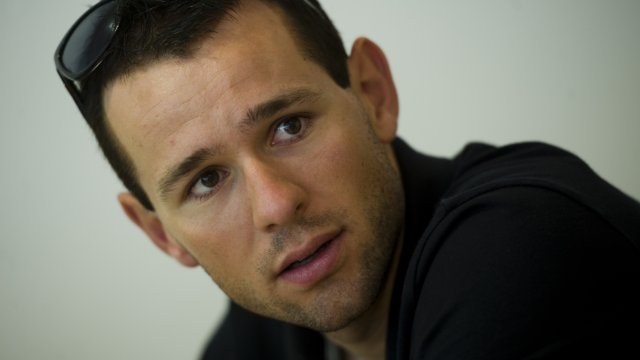Following the conclusions of the Ullrich and Contador appeals heard before the CAS, another case is pending which will have significant implications in cycling’s anti-doping efforts – that of Alex Rasmussen. While this case has garnered far less media coverage than the aforementioned two, Rasmussen’s is the case which will – in my opinion – ultimately decide the true integrity of cycling. Many had claimed that cycling’s “integrity” was on the line in the Alberto Contador case, and I could not disagree more. The Rasmussen case will be where cycling’s ultimate integrity is decided because it will determine whether the UCI is to be held accountable for their mistakes. Let me draw a parallel to my line of work here. Much like in law enforcement, when the courts don’t force the police to do their jobs in accordance with the law, then no one has the legal power to protect the accused and hold the rule enforcers accountable. If the CAS doesn’t uphold the Danish ruling on Rasmussen and the UCI is not held accountable, then their legitimacy as a governing body should be challenged by anyone involved in the sport.
Alex Rasmussen is alleged to have committed three “whereabouts” violations in 18 months, a charge he does not contest. Two violations were with Anti-Doping Denmark (ADD) and the third was with the UCI. He was provisionally suspended, pending a hearing before the Danish Federation, who eventually dismissed the charge. The reasoning was due to the UCI’s failure to follow standard protocol in notifying the accused athlete in accordance with the WADA code, which mandates that notification of a violation must be done within 14 days. The UCI did not notify Rasmussen until 10 weeks later in his case. Even when faced with this embarrassment the UCI still decided to appeal the case to the CAS. It was recently reported that the UCI acknowledges their mistake but still wants Rasmussen suspended for two years (maximum penalty) regardless. Essentially they believe they should be exempt from the same rules to which WADA, the world’s ultimate anti-doping authority, holds their athletes. This arrogance is shameful and disrespectful to athletes and fans.
Rules don’t apply to one side, they apply to everyone
The WADA code is the ultimate law of the land in relation to anti-doping, and all sports are required to follow their rules. Athletes are held to these rules, but also to those of their respective sport’s governing bodies – which in cycling is the UCI. Both sides in this case acknowledge they violated the rules and Rasmussen provided reasons for his violations, but has the UCI done so? No, they have not. Rasmussen acknowledges that he should be punished for his mistakes and accepts full responsibility for them, but does the UCI acknowledge their blatant violation of the WADA code in the same respect that Rasmussen has? No, they have not.
The UCI is appealing their case because they are hoping that the CAS will essentially give them a do-over in this case. In my opinion, the UCI and Pat McQuaid are hoping that the CAS will officially hold that they are above the law, in this case the WADA code. The rationale here appears to be that they do not need to be held accountable in the same way they expect athletes to be when they do not follow the rules. This arrogance is shameful, disgusting and a slap in the face to standard legal principles of fairness and ethics. It goes back to the age-old question of “Who holds the rule enforcers accountable?” If those who enforce the rules are not held accountable for violations they commit, then what incentive do they have not to violate those rules again if they are not held accountable by a higher authority? If the UCI is not held accountable then there will be potentially devastating impacts on the rule of law in cycling and anti-doping enforcement.
The UCI must accept responsibility before any good can come from this case
If the CAS follows the WADA code then Alex Rasmussen will return to cycling, not through what many believe is a “technicality,” but rather via proper application of the code and rules of accountability. While some argue that Alex Rasmussen broke the rules, they refuse to acknowledge the UCI did as well, and should be held to the same accountability in following the WADA code. As someone with a background in law enforcement and studying legal cases in college, I cannot ignore the fact that rules are in place for a reason and they cannot be applied unequally or arbitrarily. They apply to everyone. The only way the UCI can be ultimately held to account for their violations is for the CAS to rule in favor of Alex Rasmussen and send a strong message to the UCI that if you are going to enforce the rules you MUST follow them yourself. I strongly believe that this will be the only way the UCI might restore their own credibility, and the best way to start is to accept the responsibility that they failed to follow the rules themselves and work to ensure it doesn’t happen again. The UCI appealing this case to the CAS and still demanding a full maximum suspension in light of their own admitted violations clearly indicates they are not ready to do the right thing and accept responsibility.
In closing: Cycling’s integrity is at stake here
The cycling world is faced with a dilemma. What to do when those who enforce the rules arrogantly expect to be exempt from the rules themselves before the high court of sport? Some believe that in the interest of anti-doping those violations by the UCI should be overlooked, but I cannot disagree more vehemently. If the UCI is not held accountable for their own violations, how can they have any integrity and credibility in enforcing the rules against those to which they expect adherence? I cannot see how that is possible.
I view integrity as doing the right thing even when it may demand that you might look bad and have to acknowledge your own mistakes. It’s honesty. Can cycling fans expect the UCI to enforce the rules against their athletes if they themselves believe they can be exempt from them? Cycling’s integrity is on the line with Alex Rasmussen, because if the CAS accepts that the UCI should be exempt from the same rules they expect of their athletes, they will lose whatever shred of credibility they may have left. The best outcome in this case is that the CAS will affirm that no one, not even those who enforce them, are above the rules of our sport. The only way for that to happen is for Alex Rasmussen to be cleared by the CAS and allowed to race. Even though no one wants a guilty person to get away from punishment, it is better to let one guilty person free than to set the standard to allow an innocent rider be punished in the future. It will also serve as a stark reminder to the UCI that no one is exempt from following the rules, not even themselves.















No Comments